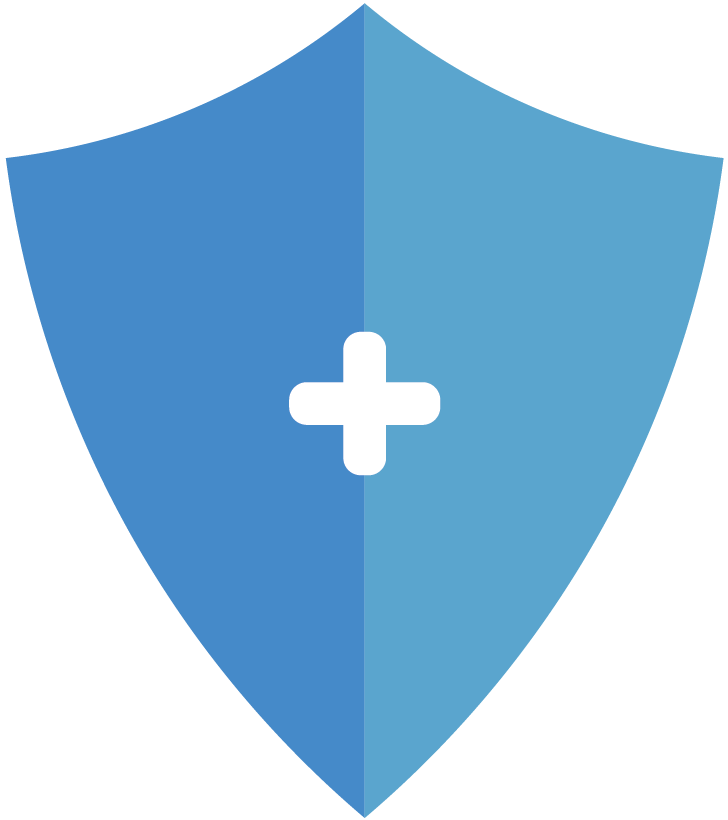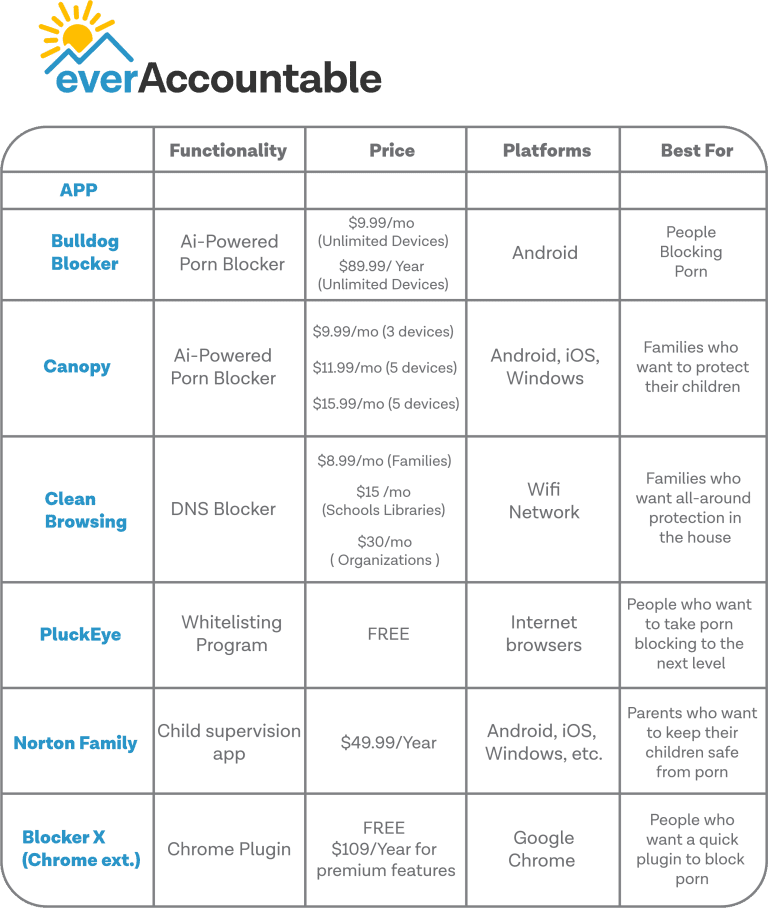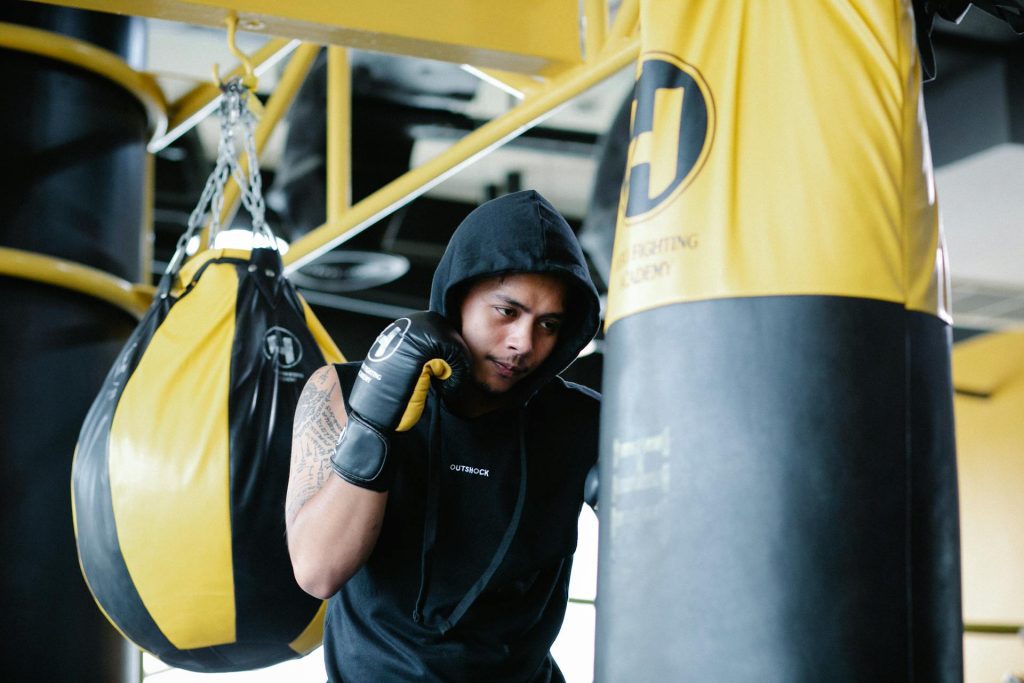Here’s the problem with most porn blockers.
There are SO MANY workarounds.
Sure, they’ll prevent you from visiting websites that are obviously for porn. But they don’t do a great job of blocking suggestive and explicit images on neutral sites and social media.
Not only that, but a lot of porn blockers make your device slow, clunky, and just overall frustrating to use.
That’s why we’ve compiled a list of the six best porn blockers on the market today.
These porn blockers are not only effective at keeping you or your children safe from explicit imagery, but they’re also some of the better performing apps available.
Note: porn blockers are NOT enough! While they make it more difficult to access porn, having an accountability partner has been proven to be much more effective at freeing you from porn than simply avoiding explicit images. More on this below!
14-Day Free Trial
Protection From Pornography
Change your habits, change your life: Start our 14-day free trial to help get rid of pornography for good.


The Top 6 porn blockers in 2024

Instead of sifting through hundreds of options, here are the top 6 porn blockers in 2024.
#1: Bulldog Blocker
| Type | Price | Platforms | Best For |
| AI-powered porn blocker | $9.99/mo | Android | Individuals trying to quit porn |
Bulldog Blocker is the best porn blocker for Android phones.
It blocks pornographic websites, and its AI-powered blocker can also detect and block explicit images on social media and any other apps on your phone, not just in your browser. It even detects and blocks explicit images before you see them!
Bulldog Blocker is designed for individuals trying to quit porn. But you might wonder, “Can’t I just turn off the blocker when I’m tempted?”
That’s why Bulldog Blocker is so effective. It doesn’t let you get off that easy!
In moments of temptation, Bulldog Blocker can delay deactivation, requiring a waiting period, or prompt you to enter a pin set by somebody else, such as your spouse or accountability partner.
This clever setting prevents you from just turning off protection whenever you feel like it.
You can also adjust the strength of the filter you need. For example, if you want to be free from all kinds of temptation, you can set Bulldog Blocker to filter out immodest clothing—not only outright explicit images.
Finally, you can also go into the settings and block specific websites or apps, or whitelist apps you need to use.
Overall, Bulldog Blocker is a very simple but powerful porn blocker on its own.
But if you pair it with having an accountability partner or app, there’s a BIG chance you’ll finally be able to break free from watching porn!
#2: Canopy
| Type | Price | Platforms | Best For |
| AI-powered porn blocker |
$9.99/mo (3 devices)
$11.99/mo (5 devices) $15.99/mo (10 devices) | Android, iOS, Windows | Families who want to protect their children |
Another great AI-powered porn blocker is Canopy.
Compared to Bulldog Blocker, Canopy is designed more for families who want to protect their children rather than individuals who want to stop watching porn themselves.
When using Canopy, you install the Canopy App on the parent’s or accountability partner’s device and the Shield App on the child’s phone or devices (or the person you want to protect).
The Canopy App allows parents or partners to set filters, block websites or apps, track their child or partner’s location, and set daily screen time limits. The removal prevention feature also makes it difficult to uninstall the Shield App without permission from the “manager” of the Canopy App.
All these features, plus a strong AI-powered filter that detects and blocks explicit images, make Canopy a great app for families.
#3: Clean Browsing
| Type | Price | Platforms | Best For |
| DNS Blocker |
$8.99/month (Families)
$15/month (Schools and Libraries) $30/month (Organizations) | Wifi Network | Families who want all-around protection in the house |
Unlike Bulldog Blocker and Canopy, Clean Browsing doesn’t block porn on people’s phones or laptops. Instead, it blocks porn on an entire wifi network.
This way, you can ensure that everyone can browse the internet safely at home.
Aside from pornography, Clean Browsing also allows you to customize which sites and pages you block. It also comes with 21 predefined category blocks, so you can easily block gambling, malicious content, and other adult content from your network.
Not only can Clean Browsing protect your network, but you can also install Clean Browsing on your and your children’s devices so that they can’t access porn even when they’re connected to different wifi networks.
Clean Browsing can be a little trickier to deal with than other apps. But once it’s set up, it’s a great way to keep porn away from the entire household!
#4: PluckEye
| Type | Price | Platforms | Best For |
| Whitelisting program | Free | Internet browsers | People who want to take porn blocking to the next level |
If you’re looking for a program that takes porn blocking to the next level, Pluckeye might be the one for you!
The name comes from Matthew 5:29, where Jesus talks about plucking your eyes out if they cause you to stumble. Just from that, you can already tell that this program is a bit more extreme than other porn blockers.
Pluckeye takes a different approach. Instead of choosing which websites you want to block, Pluckeye blocks EVERYTHING, and you simply choose the websites that you still need. This is known as whitelisting.
PluckEye will definitely affect your everyday browsing because of how extreme it is. However, for people who are really serious about ending porn use, PluckEye can be a very helpful tool.
#5: Norton Family
| Type | Price | Platforms | Best For |
| Child supervision app | $49.99/year | Android, iOS, Windows, etc. | Parents who want to keep their children safe from porn |
You’ve probably heard of Norton before. Norton built one of the most popular antivirus software on the internet today.
Aside from antiviruses, they also created Norton Family, a child supervision app.
While it’s not directly a porn blocker, Norton Family does a great job at keeping your children away from explicit websites and apps. Norton Family also allows you to see what your children are using their devices for, as well as check what they’re watching on platforms like YouTube.
Norton Family also allows you to manage your children’s internet use. You can set time limits, block websites, and apps you don’t want them to use, and receive detailed reports on everything your children do on their devices.
#6: Blocker X Chrome Extension
| Type | Price | Platforms | Best For |
| Chrome plugin |
Free
$109/year for premium features | Google Chrome | People who want a quick plugin to block porn |
If you’re looking for a quick Google Chrome plugin to block porn, consider Blocker X.
Keep in mind that Blocker X is much more than just a Chrome Plugin. However, their quick-and-easy installation plugin is something that sets them apart from other porn blockers.
With their free plugin, Blocker X will prevent you from visiting all pornographic websites. You can also block any website you want to avoid (up to five websites on the free version).
Blocker X also knows that having an accountability partner is important. That’s why, when setting up, you choose a buddy to help you out. If you ever want to unblock a website, you’ll need your accountability partner’s permission first.
Aside from the plugin, you can also get Blocker X for your phone, laptop, and other devices.
Honorable Mentions
Aside from the six above, here are a few other highly-rated resources designed to eliminate porn usage that you might want to check out:
- Covenant Eyes – An accountability app where you choose a partner, and they get alerts whenever you view inappropriate material
- Net Nanny – A cheaper parent-child porn blocker with plenty of features for great value
- Bark – A porn-blocking app with a highly modern UI and UX
- The Freedom Fight – A free 25-week program designed to get you off porn for good
Why porn blockers are not enough
Porn blockers are great at preventing impulsive porn viewing.
However, they are simply NOT enough to get rid of porn completely.
Not only are there a few clever workarounds, but porn blockers simply shield you from porn without dealing with the root problem. Porn blockers don’t free you from porn addiction—and should an opportunity arise, there’s no guarantee you’ll be strong enough to resist temptation.
That’s why aside from getting a porn blocker if you’re REALLY serious about stopping, the number one thing you should do immediately is to get an accountability partner.
The statistics are clear: Accountability partners are the number one way to quit porn.
They are very often the missing piece for people struggling with porn addiction. Finding someone to listen to your struggles, encourage you, and hold you responsible for your actions goes a long way in freeing yourself from porn use.
That’s why aside from getting a porn blocker like Bulldog Blocker, you should find a trusted partner or friend to help you on your personal journey.
How to combine porn blockers with accountability
If you’re serious about quitting porn, here’s a tried and tested method to get it done!
Find an Accountability Partner
Yes, we know it can be embarrassing to admit to someone that you have a porn problem.
But just getting it off your chest and confiding in someone you trust is already a BIG step towards freedom from porn.
So find that someone you can trust. It can be your spouse, a leader from church, someone who has the same struggle as you, or just anyone you know you can trust.
Make sure you set up regular check-ins with your accountability partner to stay on track!
This is a critical step to ensure that you keep up your fight against porn. Remember, nobody gets rid of porn addiction in a day. It’s an ongoing battle that can take a long time to overcome!
Download a Porn Blocker
You can download a porn blocker like Bulldog Blocker and try to fight porn yourself.
But if you’re serious about quitting, you should get a porn blocker after you already have an accountability partner.
This is because porn blockers are just a tool to make your fight easier. They can’t win your battle for you.
That’s why with the help of your accountability partner, you can choose a porn blocker that’s right for you!
14-Day Free Trial
Protection From Pornography
Change your habits, change your life: Start our 14-day free trial to help get rid of pornography for good.
Consider downloading an accountability app
What happens when you combine accountability and a porn blocker?
You get 95% of people seeing a drop in porn use.
Ever Accountable is exactly that.
This app makes it easy for your accountability partner to keep an eye on you. The app sends reports to your accountability partner on what you view on your device. Should you ever view explicit content, it will alert your accountability partner right away.
Think about it… if your accountability partner was looking over your shoulder, you wouldn’t look at porn, would you?
That’s why 95% of people who use Ever Accountable see a drop in porn use right after installing the app.
What’s more, you can also use Ever Accountable as a porn blocker. By default, the app doesn’t block porn and other explicit material. However, you can easily tweak the settings and completely remove explicit images from view.
Overall, accountability apps like Ever Accountable are the perfect way to match both accountability and porn blockers.
Conclusion
Porn blockers are a great way to help you to stop watching porn.
Choose any of the top six blockers above, and you should have a much easier time avoiding porn.
But if there’s one thing you should take away from this article, it’s that porn blockers by themselves are NOT enough.
That’s why you should get yourself an accountability partner and download an accountability app like Ever Accountable today!
14-Day Free Trial
Protection From Pornography
Change your habits, change your life: Start our 14-day free trial to help get rid of pornography for good.





